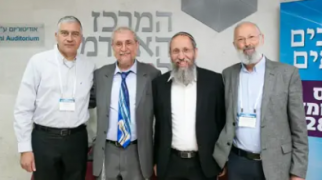May 6, 2024
In response to the tragic events of October 7th, where Israel’s telecommunications infrastructure was at risk of compromise, students at JCT immediately began to develop innovative solutions aimed at safeguarding Israel’s security on both civil and cyber fronts.
The students and alumni developed a web-based solution for civil defense units, and a chrome extension using generative AI to create automatic responses to antisemitic content online.
Ever since Oct. 7, when Hamas was able to sabotage Israel’s standard telecommunications systems in order to infiltrate into the country and murder some 1,200 people, high-tech companies have been searching for solutions to enable communication between authorities if standard methods are compromised. JCT’s unique solution came from the College’s Schreiber Lev Tech Entrepreneurship Center and its Take Action program, which called on students and alumni to come up with solutions for better practices in an emergency situation.
On the civil front, FullStack Systems Ltd. has created a web-based solution enabling civil defense units to communicate with each other during emergencies if internet service is down. This solution operates via telephone rather than cellular network, and consequently is not dependent on internet connectivity. It enables voice messages to be transmitted to alert civil defense units in times of emergency, even if traditional internet services are malfunctioning.
The system works by enabling automatic dialing to a large list of the civil defense unit participants, whereby they can receive alerts about possible infiltration or suspicious activity. Since it is not dependent on internet connectivity, the system is able to communicate with kosher cellular devices as well, thereby making it inclusive for Haredi Jews who are participating in these civil defense units. The simplicity of the system also makes it attractive to participants who are older and potentially less technologically savvy.
Today, there are some 60 civil defense units across the country and each of them stand to benefit from this system.
“This web-based system can instantly send voice messages to one or all of the participants with the push of a button, regardless of functioning internet capabilities,” said Efrat Amitai, a project leader at FullStack Systems Ltd. “In some municipalities, these alerts are done via WhatsApp, but this app is dependent on functioning internet or Wi-Fi. As we’ve seen, that can easily fail or it’s easy to miss messages due to an overwhelmed network or simply human error where people fail to notice a message they receive.”
Rami Triestman, the company’s CEO, explained that the system was born out of his own personal experience as a member of a civil defense unit.
“One night, I went to bed and I browsed through my WhatsApp messages and it took me a few minutes to realize that we’re in the middle of an emergency situation. I decided to develop a system that would not be dependent on the internet and sends direct messages to recipients that can’t be misconstrued or missed,” he said.
Triestman added, “The system leverages ‘old-fashioned’ technology, by utilizing a simple phone call. With one push of the button, everyone on the list is told how they must proceed and if this call is an actual emergency or a drill. If the person doesn’t answer the phone, the system continues calling until the person picks up and can even bypass a user putting his phone on silent. This frees up the civil defense unit leader to worry about the issue at hand instead of spending his time sending messages and calling people hoping to reach them.”
Eran Yomtovyan, director of the Schreiber LevTech Entrepreneurship Center, said, “We’re very proud of the work Rami has done in coming up with creative solutions to reinforce Israel’s security. Graduates of the Jerusalem College of Technology have gone on to do meaningful work enhancing Israel security networks. From working in Israeli-owned defense companies like Elbit to finding ways for Israeli civilians to protect themselves, it’s gratifying to see our graduates use what they’ve learned here at the Jerusalem College of Technology to protect Israel and make it stronger.”
Meanwhile, in a separate initiative, with the internet inundated with antisemitic content online, many Jewish advocates have felt frustrated in their inability to respond to such harmful rhetoric in an efficient manner. In response, JCT students developed Savee, a chrome extension using generative AI technology. The extension analyzes texts and simultaneously collects facts to counter anti-Israel and antisemitic narratives online from a validated database. Then, the tool summarizing the database formulates an accurate facts-based response.
Once the user downloads the extension, they can then highlight the text they object to, right-click the highlighted section and then the tool generates an answer debunking said text within seconds.
When activated, Savee sends the highlighted text to a Botify system, which converts the text into mathematical representation in order to analyze it. The system then connects to a pre-verified database and looks for the most relevant data for the specific text in question. Lastly, the system prompts chat-GPT to phrase a summarized answer based solely on the facts found in the database.
On the Savee’s website, they illustrate how this can be done in a matter of seconds. In a video, they share how one can, for example, generate an auto response to popular antisemitic accounts on X (formerly Twitter) like Jackson Hinkle by instantly pulling a relevant response from its database.
To date, Savee has responded to 700 posts per day, reaching 7.3 million users in order to combat antisemitism, Jew-hatred, and Holocaust denial content on social media. JCT students Ido Schwartz, Ori Kessler, and Eliya Liv came up with the idea during a hackathon at the College which aimed to find technological solutions for the challenges of Holocaust survivors as well as Holocaust education and memorialization. Savee’s founders are all third-generation descendants of Holocaust survivors.
“In our research, we were amazed by the scope of the phenomenon of Holocaust denial and its significant growth potential,” the students stated. “We aim to counteract the phenomenon by raising awareness of existing yet not sufficiently accessible facts. This is especially important in today’s digital sphere, where even the truth may be subjective until it is proven otherwise.”
Israel Hayom April 12, 2024 https://www.israelhayom.com/2023/12/04/jerusalem-college-of-technology-students-alumni-develop-solutions-to-protect-israel-on-home-cyber-fronts/




